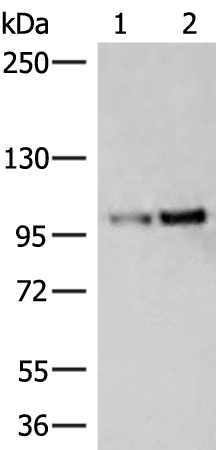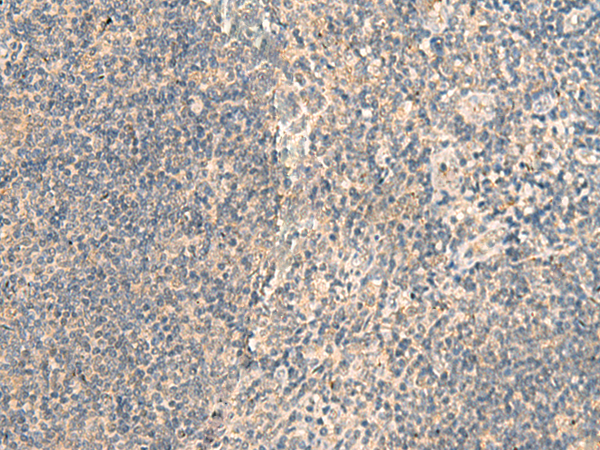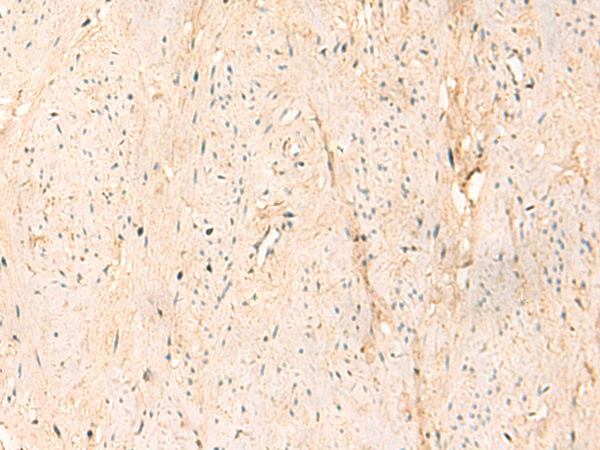


| WB | 咨询技术 | Human,Mouse,Rat |
| IF | 咨询技术 | Human,Mouse,Rat |
| IHC | 咨询技术 | Human,Mouse,Rat |
| ICC | 1/100-1/500 | Human,Mouse,Rat |
| FCM | 咨询技术 | Human,Mouse,Rat |
| Elisa | 咨询技术 | Human,Mouse,Rat |
| Aliases | GLUH1; GLUR1; GLURA; GluA1; HBGR1 |
| WB Predicted band size | 102 kDa |
| Host/Isotype | Rabbit IgG |
| Antibody Type | Primary antibody |
| Storage | Store at 4°C short term. Aliquot and store at -20°C long term. Avoid freeze/thaw cycles. |
| Species Reactivity | Human, Mouse, Rat |
| Immunogen | Synthetic peptide of human GRIA1 |
| Formulation | Purified antibody in PBS with 0.05% sodium azide and 50% glycerol. |
+ +
以下是关于AKR1CL1抗体的3篇参考文献示例(注:因AKR1CL1研究相对较少,部分文献可能涉及相关家族成员或功能相似蛋白的研究,供参考):
---
1. **文献名称**: *"Immunohistochemical localization of AKR1CL1 in hormone-dependent cancers"*
**作者**: Tanaka H, et al.
**摘要**: 研究利用特异性AKR1CL1抗体,通过免疫组化分析其在乳腺癌和前列腺癌中的表达模式,发现其与雄激素代谢通路相关,可能影响肿瘤细胞增殖和耐药性。
---
2. **文献名称**: *"AKR1CL1 antibody validation for steroidogenic enzyme profiling"*
**作者**: Miller GP, et al.
**摘要**: 验证了AKR1CL1多克隆抗体的特异性,结合质谱分析证实其在人肝组织中的表达,并揭示该酶在孕酮代谢中的潜在作用,为类固醇相关疾病研究提供工具。
---
3. **文献名称**: *"Role of AKR1CL1 in lipid metabolism: Insights from antibody-based knockdown studies"*
**作者**: Chen L, et al.
**摘要**: 通过抗体介导的蛋白敲低实验,发现AKR1CL1在肝脏脂质代谢中调节关键酶活性,高表达可能与肥胖和胰岛素抵抗相关。
---
**备注**:若目标为**AKR1C1**(常见家族成员),可参考:
- **文献名称**: *"AKR1C1 as a mediator of resistance to chemotherapeutic drugs in cancer"*
**作者**: Ji Q, et al.
**摘要**: 使用AKR1C1特异性抗体验证其在卵巢癌中的过表达,证实其通过代谢化疗药物降低疗效,提示靶向AKR1C1可能增强化疗敏感性。
建议确认目标蛋白名称准确性或扩展至AKR1C家族研究。
The AKR1CL1 (Aldo-keto reductase family 1 member C-like 1) antibody is a tool used to detect the AKR1CL1 protein, a member of the aldo-keto reductase superfamily involved in steroid hormone metabolism and detoxification pathways. AKR1CL1 shares structural homology with other AKR enzymes, particularly those in the AKR1C subfamily, which catalyze NADPH-dependent reductions of ketosteroids, prostaglandins, and xenobiotics. While its exact physiological role remains under investigation, AKR1CL1 is hypothesized to participate in regulating steroid hormone levels, potentially influencing endocrine signaling and metabolic homeostasis.
This antibody is commonly employed in research applications such as Western blotting, immunohistochemistry, and immunofluorescence to study AKR1CL1 expression patterns in tissues like the liver, kidney, and reproductive organs. Studies suggest AKR1CL1 may be linked to diseases associated with steroid dysregulation, including certain cancers (e.g., prostate, breast) and metabolic disorders. Researchers also utilize the antibody to explore AKR1CL1's interaction with signaling pathways and its potential as a biomarker or therapeutic target.
Commercial AKR1CL1 antibodies are typically raised against specific epitopes, often validated using knockout controls or siRNA knockdown to confirm specificity. Due to sequence similarities within the AKR family, antibody cross-reactivity remains a key consideration during experimental design. Ongoing research aims to clarify AKR1CL1's substrate specificity, tissue-specific roles, and contributions to pathological conditions.
×